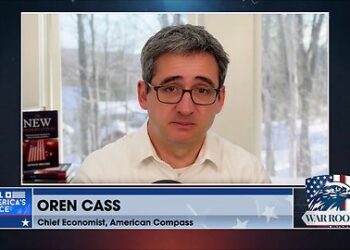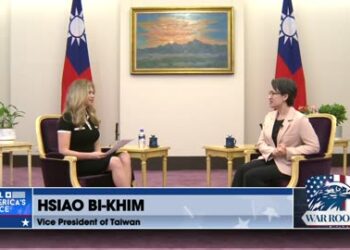The economy of the People’s Republic of China (PRC) is always under strain because of the misrule of the Chinese Communist Party (CCP). It is as close to the law of politics as you can get that Communists have always mucked up any economy with which that ideology came in contact. But with a weakening domestic economy, and the indication from the CCP’s Third Plenum in July is that the CCP leadership has no idea about how to improve their economy, means the decline is going to continue. Moreover, foreigners are investing far less than they once did in the PRC—although that is still too much investment, particularly for U.S. entities—and firms are looking for ways to exit the PRC in favor of investing in India, Vietnam, or other more stable and secure countries. In addition to the escalating global tensions from PRC threats against the Philippines and Taiwan, the Russo-Ukrainian war and war in the Middle East, other major uncertainties such as the prospect of President Donald Trump returning to the White House are stressing the CCP’s abilities.
This occurs at a time when the PRC’s economy is in free fall for domestic reasons too. Consumer demand is lagging because much of the Chinese population are savers and not spenders. Many Chinese lost their savings during the country’s lengthy and Draconian Covid-19 lockdowns, and so their wealth is in their property. However, the property market, which is also essential for local government spending, has collapsed. There have been warnings that the real estate market’s bubble is collapsing. This was illuminated by Evergrande Group’s bankruptcy in January 2024. In 2018, Evergrande was listed as the world’s most valuable real estate company, but just three years later, it was on the cusp of bankruptcy before its final demise this year with over $300 billion in debt. The PRC invests between 20% and 30% of GDP annually in the country’s property and infrastructure sectors, and so that would be more damaging to the PRC’s economy than the U.S. financial crisis of 2008—with adverse impacts for the global economy as well. Evergrande’s collapse has become symbolic of a PRC economy that faces major and immediate obstacles: a collapsing property market, slowing growth, increasing debt, and a shrinking workforce.
Now exports are weakening, and imports are rising sharply. This signals that export-led economic growth, the mainstay of the PRC’s economy for more than a generation, may be over. Xi has expressed his intention to lift productivity through advanced technology investments, manufacturing, and innovation—an effort to wrestle control of the "commanding heights” of global technology away from the United States, Japan, South Korea, and Taiwan. Nominally, Xi is attempting to shift the PRC’s economy from exports to a greater reliance on domestic growth. This is likely to fail, which will only worsen the PRC’s economic and social malaise.
Faced with bad economic news on every front, the PRC’s dictator Xi Jinping is advancing an economic model aimed at strengthening the PRC’s resilience and self-sufficiency — this is not an economic plan to save the PRC’s economy but has ominous and bellicose undertones.
At a time of economic pain for the PRC, Xi’s latest policy is indicative of his intentions: He is planning for war. The genesis of this new economic model is to fortify the PRC’s economy from "extreme situations” including a protracted war, another pandemic, or other external shocks. What Xi is attempting is a new iteration of autarky. The Soviets, the Nazis, and North Korea have all tried policies of economic isolation before. As these examples suggest, states adopt autarky as they move to a war footing to insulate their economies and populations from the effects of a war, and to allow the military to sustain conflict in the face of embargo, blockade, and other tools of economic warfare. Xi’s policies are telling because they center on food and energy security, supply-chain robustness, civil defense mobilization, and the development of strategic reserve infrastructure. These are efforts to harden the PRC’s economy and to prepare the country for "extreme-case” scenarios, so that the PRC is resilient in the face of potential crises — which it may provoke through aggression against Taiwan, the Philippines, Japan, or the United States.
A slowing PRC economy adversely impacts the global economy, and Xi is likely trying to ensure that the rest of the world’s economy slows as the PRC’s does. There is tremendous vulnerability in the global economy. The economic unrest set off by the recent meltdown of the Japanese stock market was due to the Japanese central bank’s low interest rate policy and the carry trade policy it incentivized, which became unsustainable and, in turn, led to a correction in the world market. Japan is stuck at low interest rates, with high debt-to-GDP ratios that mirror the U.S. problems. Those are risks that can be exploited.
Xi will do his utmost to manipulate macroeconomic forces to ensure that fiscal chaos is segueing into economic chaos. Chaos is good news for Xi because he wants the U.S. to be hurt as well. There is much fodder that Xi can manipulate to hurt the major Western economies such as the U.S. and Japan. The American people should expect that Xi will do his utmost to sow economic and political chaos in the U.S. He is hardening his economy as he prepares for war, while seeking to weaken the U.S. economy. The U.S. economy is unprepared for the great shocks Xi’s policies could cause, and the Biden administration is not preparing the American people for the unrest that lies ahead.
Bradley A. Thayer is a Contributing Columnist for Warroom and is the coauthor, with James E. Fanell, of Embracing Communist China: America’s Greatest Strategic Failure. Find him on Gettr and Truth as @bradleythayer and as @bradthayer on X.




